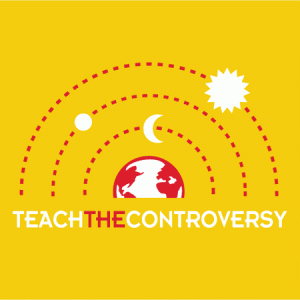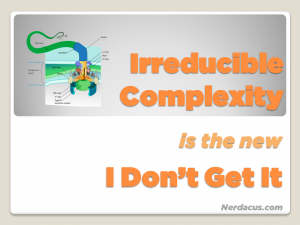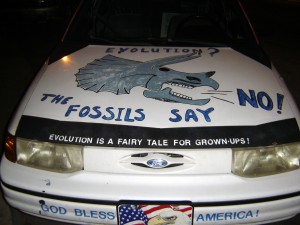 Whenever people say “I don’t believe in evolution” it strikes me as odd. Given that evolution is a solid scientific theory and one that we can observe taking place, the choice not to “believe” in it seems like one that is inspired either by ignorance or by a stubborn rejection of reality. Either way, I’m not one to say you can’t refuse to believe in evolution, but I sure as hell don’t have to respect your position on the subject.
Whenever people say “I don’t believe in evolution” it strikes me as odd. Given that evolution is a solid scientific theory and one that we can observe taking place, the choice not to “believe” in it seems like one that is inspired either by ignorance or by a stubborn rejection of reality. Either way, I’m not one to say you can’t refuse to believe in evolution, but I sure as hell don’t have to respect your position on the subject.
As we’ve seen recently with the pathetic Miss USA responses when asked if evolution should  be taught in school (Seriously?!? Next are they going to ask if heliocentricity should be taught in school? My stars…) a lot of people like to take the safe position that “either belief” ought to be represented – suggesting not only that evolution itself is a belief, but that the only counter to evolution that exists is the Christianity-based concept of creationism.
be taught in school (Seriously?!? Next are they going to ask if heliocentricity should be taught in school? My stars…) a lot of people like to take the safe position that “either belief” ought to be represented – suggesting not only that evolution itself is a belief, but that the only counter to evolution that exists is the Christianity-based concept of creationism.
But the most egregious error in this thinking is the comparison between creationism/Intelligent Design and evolution as if they are on equal footing as “beliefs”. Creationism and Intelligent Design certainly are beliefs. In fact, I feel like one requires a very bright and active imagination to support either of these concepts as if they are true. The amount of evidence and information that must be ignored in order to seriously believe that the earth was made by a god (not something evolution concerns itself with, but a claim that is prevalent in creationism) or that everything was made as it is by a creator takes some serious make-believe skills. We know how the eye evolved at this point. Irreducible complexity is a sham – as long as you take a good look at all the evidence.
as you take a good look at all the evidence.
By contrast, the concept of evolution began as all science begins – as a hypothesis which could at any moment have been (and could still be) proven wrong. In fact, many people argue that science isn’t the practice of proving anything right, it is the constant process of proving things wrong. Like the Cat in the Hat trying to find the missing something by finding out where it’s not, science is similar in that we can hardly ever find anything that can be with 100% certainty labeled as true, but we can easily weed out information or ideas which are proven false. And if something stands the constant barrage of testing for a long enough period of time, that idea becomes considered a “theory”.
 We’re not talking Sherlock Holmes and his whimsical theories that the pips found at the scene of a crime were from a particular orange only grown in a particular place which indicate death for a group of old men. The scientific definition of theory is very different from that way in which the word is commonly used. When Sherlock suggests his theory on where the seeds of a fruit are from and what they represent, he’s essentially saying “I have an idea these are from this orange, from this place, and they symbolize this.”
We’re not talking Sherlock Holmes and his whimsical theories that the pips found at the scene of a crime were from a particular orange only grown in a particular place which indicate death for a group of old men. The scientific definition of theory is very different from that way in which the word is commonly used. When Sherlock suggests his theory on where the seeds of a fruit are from and what they represent, he’s essentially saying “I have an idea these are from this orange, from this place, and they symbolize this.”
The “theory” in the Theory of Evolution is far far FAR more complicated than that. In fact, it often takes at least 50 if not 100 years for a hypothesis to be considered a theory and something can only be considered a theory if there is no evidence found that can prove the hypothesis to be false. These ideas not only have to withstand the scrutiny of those contemporary thinkers who might try to discredit a hypothesis, they have to stand up against decades, literally generations of scrutiny before they are considered strong enough explanations of the natural world to be labeled a theory.
So – if you want to take the position that you don’t believe in evolution – well, there’s nothing I can do about that. I certainly hope you’re not in a medical profession and if you are, please let me know so I can avoid ever coming into contact with you in any kind of professional setting, but you can believe or not believe whatever you want. However, if you claim a disbelief in evolution or a belief in creationism instead of evolution, don’t get pissed off when I laugh in your face and let you know how little respect I have for your position.
you’re not in a medical profession and if you are, please let me know so I can avoid ever coming into contact with you in any kind of professional setting, but you can believe or not believe whatever you want. However, if you claim a disbelief in evolution or a belief in creationism instead of evolution, don’t get pissed off when I laugh in your face and let you know how little respect I have for your position.
Unless you have some empirical (i.e. – not biblical) evidence to back up your assertion.
If that’s the case, we can totally talk.